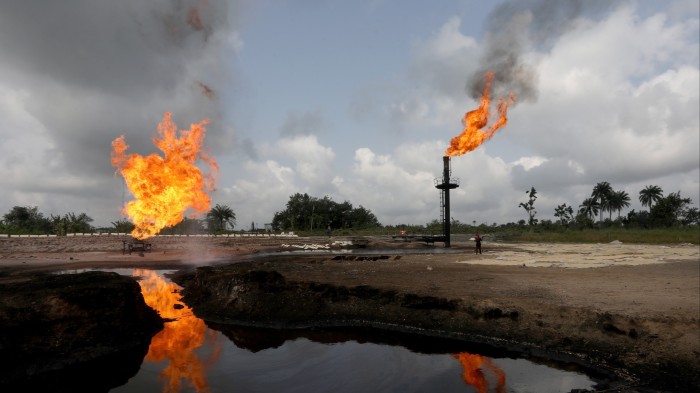Unlock the Editor’s Digest for free
A series of mysterious fires and explosions at oil and gas pipelines in Nigeria’s oil-rich Niger Delta is posing a significant threat to the country’s oil production and has escalated into a national political crisis.
In the past week, there have been reports of at least three incidents of fires and blasts at oil and gas pipelines in Africa’s largest oil-producing nation. President Bola Tinubu recently declared a state of emergency in Rivers State in the Delta region, citing political dysfunction and attacks on oil installations as the primary reasons.
As part of the emergency measures, Tinubu suspended the state governor, Siminalayi Fubara, along with his deputy and state lawmakers. He appointed a retired vice-admiral of the Nigerian Navy as an interim administrator to oversee the region.
While the perpetrators of the attacks remain unidentified, the Niger Delta has a history of militant groups targeting pipelines and oil infrastructure. Rivers State has also been plagued by political violence, with accusations of officials using thugs to attack pipelines and engage in conflicts.
President Tinubu, who took office in 2023, has made it a priority to enhance security measures to increase Nigeria’s oil production. Under his administration, oil output has risen to at least 1.4 million barrels per day, a significant improvement from the lows experienced during his predecessor Muhammadu Buhari’s tenure. Tinubu aims to further raise production to 2 million barrels per day.
With oil and gas exports contributing significantly to Nigeria’s government revenue and foreign exchange earnings, any prolonged disruptions due to vandalism could have severe implications for the country’s finances.
Tinubu has linked the pipeline vandalism to the political crisis in Rivers State, alleging that the governor failed to address security concerns leading to the attacks. However, Fubara has denied any involvement with militant groups.
Critics have accused Tinubu of using the state of emergency declaration as a pretext for a politically motivated power grab, potentially undermining Nigeria’s democratic principles by expanding the president’s authority.
Prominent figures such as former President Goodluck Jonathan and Nobel laureate Wole Soyinka have condemned Tinubu’s actions, calling them an assault on federalism and democracy. This marks only the third instance since Nigeria’s return to democracy in 1999 that a state of emergency has been used to suspend an elected state legislature.
The Trans Niger Pipeline, a critical component responsible for a significant portion of Nigeria’s crude exports, recently experienced a fire outbreak. After a week of disruption, operations were fully restored at the pipeline, which has a capacity of 450,000 barrels of crude per day.
The political turmoil in Rivers State began when Fubara assumed office as governor in May 2023, following a rift with his predecessor and Tinubu’s ally, Nyesom Wike. The Supreme Court of Nigeria ruled last month that there was no functioning government in Rivers due to the incomplete state legislature, further complicating the situation.
Despite the state of emergency, pipeline fires have persisted, prompting skepticism about the government’s actions. Analysts suggest that the ongoing crises in Rivers State require a more nuanced approach to address the underlying issues effectively.
In conclusion, the political and security challenges in Nigeria’s oil-rich Niger Delta region underscore the complexity of governing a vital sector that significantly influences the country’s economy. Finding a balance between security measures, political stability, and economic growth is crucial to ensuring sustainable development in the region.
[Source: Financial Times]







